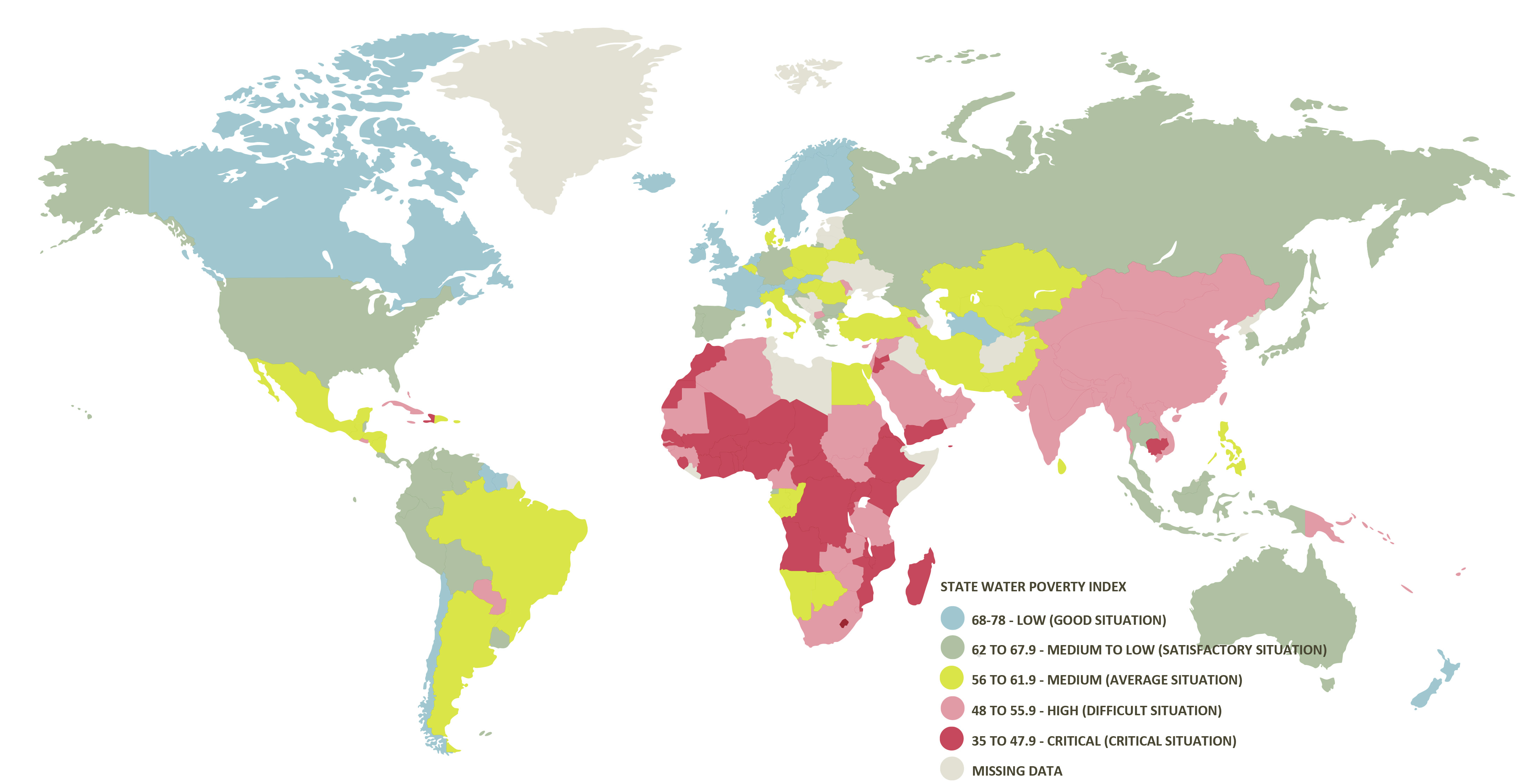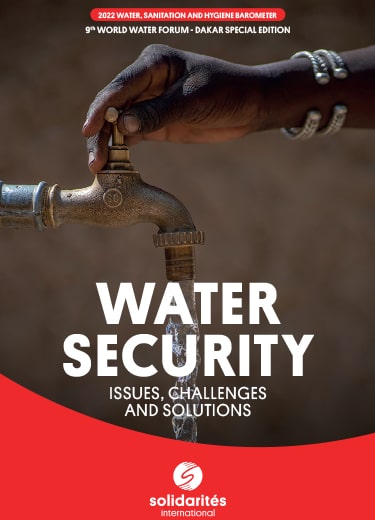Water
Despite the fact that access to drinking water and sanitation has been recognized as a human right since 2010, nearly 2.2 billion people still do not have access to safely managed domestic drinking water supply services today. ‘’Worse, in sub-Saharan Africa, the number of people using probably contaminated water increased by 45% between 2000 and 2017,” warns expert Gérard Payen. 3,5 billion people still do not have access to safely managed sanitation services, which represent 2 out of 5 peoples worldwide¹.
As a result, insufficient access to water, sanitation or hygiene is annually responsible for 1.6 million preventable deaths, with 60% attributed to diarrheal diseases.
As humanitarian workers, we are combatting this scourge at ground level, day in day out, but also fighting national and international bodies to ensure that those we help have their voices heard
UNSANITARY WATER: A SILENT, OVERLOOKED SCOURGE
billion
people still lack basic sanitation in 2022
children under the age of 5
die every year from diseases related to unsanitary water and environmental conditions
billion
people do not have access to safely managed domestic drinking water supply services
minutes a day
is the time women/girls often spend collecting water (men/boys: 3 minutes)
of all natural hazards
are water related
people still lack basic sanitation in 2022
die every year from diseases related to unsanitary water and environmental conditions
people do not have access to safely managed domestic drinking water supply services
is the time women/girls often spend collecting water (men/boys: 3 minutes)
are water related
A source of life, development, economy and education, water is unfortunately all too often a cause of poverty, disease and death. Every year, 300,000 children under the age of 5 die from diseases related to unsanitary water and environmental conditions¹.
3,5 billion people still do not have access to safely managed sanitation services. Among them, 419 million still practice open defecation¹.
“Tons of fecal matter are deposited in the natural environment. A single gram contains up to 10,000 viruses, including poliomyelitis and one million bacteria responsible for dysentery, diarrhea and cholera. Dying from these diseases today should be unthinkable.” It is estimated that access to toilets and routine handwashing could save hundreds of thousands of lives deaths every year.
STATE WATER POVERTY INDEX

Map : l’Atlas mondial de l’eau, David Blanchon, cartography : Aurélie Boissière (Editions Autrement).
OUR FIGHT: DRINKING WATER FOR EVERYONE
Of course, progress has been made, but it is very insufficient and we know that the current trajectory will not make it possible to achieve the 17 Sustainable Development Goals (SDGs) in 2030, particularly in the area of access to water, especially in Africa, where the population will double within 30 years.”
Alain Boinet, founder of SOLIDARITÉS INTERNATIONAL
Having worked on the ground since 1980 delivering aid to alleviate some of the most severe humanitarian crises (Afghanistan, Rwanda, Indonesia, DRC, Horn of Africa, Sahel, Philippines, Nepal, etc.), SOLIDARITÉS INTERNATIONAL has made the fight against water-related diseases its major combat. This decision was motivated by a three-fold observation: the vital issue of water, sanitation and hygiene (WASH) in crisis situations, the dramatic mortality induced by water-borne diseases, and, lastly, the fact that just 15 years ago nobody was talking about the urgency of combatting this major cause of mortality.
Recognized for its expertise and knowhow in water, sanitation and hygiene access issues, SOLIDARITÉS INTERNATIONAL has enabled millions of people worldwide over the last 40 years to enjoy improved access to this vital resource, by implementing humane solutions adapted to suit specific local situations.
A fight led at the highest level
Access to water and sanitation is a major element when it comes to boosting the resilience of populations faced with the effects of crises and natural disasters, as well as the impacts of climate change. That’s why, as well as conducting humanitarian missions in some of the world’s most volatile areas for more than 15 years, SOLIDARITÉS INTERNATIONAL has also made it its duty to influence public policies. This is a long-term exercise in conjunction with our French Water Partnership partners, which aims to ensure that the right top-level decisions are made when it comes to combatting the scourge of unsanitary water, in France, Europe and at the United Nations.
Our information and awareness-raising campaigns run every year to mark “World Water Day” on 22 March, including our drinking water petition signed by 200,000 of our fellow citizens, have actively helped to ensure that a water/sanitation objective finally becomes a priority. This became a reality in September 2015 when the United Nations adopted the 17 Sustainable Goals (SDGs), the sixth objective of which aims to provide universal access to water and sanitation by 2030.
2030: less than 10 years to reach the goal !
Faced with this very ambitious challenge, we remain vigilant and persistent in raising the voice of people with no access to drinking water in national and international collectives, bodies, networks and summits, such as the United Nations Water Conference in New York, the World Water Forum, the French Water Partnership, the UN Climate Change Conference, World Water Week, and regular monitoring of 2015 – 2030 SDGs.
Being aware that the international community’s efforts will not be enough to achieve this goal, SOLIDARITÉS INTERNATIONAL persists in its efforts to call on national and international actors, both public and private, to take up their responsibilities.
To this end, the upcoming World Water Forum, taking place from 18 to 25 May 2024 in Indonesia, under the theme “Water for Shared Prosperity” represents a real opportunity to mobilize all authorities and stakeholders. Six main topics will be addressed : water security and prosperity, water for people and nature, disaster risk reduction and management, governance, cooperation and hydro-diplomacy, sustainable water finance, and innovation and knowledge.
SOLIDARITÉS INTERNATIONAL will continue its commitment to the Sustainable Development Goals by coordinating two sessions : “Achieving SDG 6 in crisis and fragile contexts” and “Improving emergency responses to water-related disasters”.
The achievement of these ambitious yet essential goals (Agenda 2030) remain seriously threatened by the inadequacy of the efforts provided to those required. This is particularly true in contexts of crisis and fragility, often affecting highly vulnerable populations.
However, if we want to “leave no one behind” and because we think that “it is only by the inclusion of the most vulnerable people that we can hope to achieve the SDGs”, we must concentrate our efforts where our mandate requires us to act, at the heart of humanitarian crises.
There are less than 10 years to achieve universal access to drinking water, despite the fact that it has been considered a human right by the United Nations since July 2010! The world is thirsty, it is no longer time to wait and no one should be abandoned!”
Alain Boinet, founder of SOLIDARITÉS INTERNATIONAL
Our Water Barometer
Every year, SOLIDARITÉS INTERNATIONAL publishes the Water, Sanitation and Hygiene Barometer (WASH survey). Researchers, politicians, doctors, geographers, and NGOs from the north and south are all invited to contribute to this publication, to share their viewpoints and observations, and thereby to create a picture of this vital resource. A benchmark document, the Water, Sanitation and Hygiene Barometer is designed to alarm and challenge the general public and both national and international decision-makers in terms of the actions to be undertaken at local and global levels.

